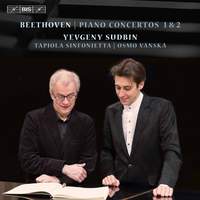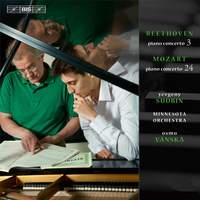Interview,
Yevgeny Sudbin on late Beethoven
 After the conclusion of his Beethoven concerto cycle in 2017, we knew it wouldn't be long before the prolific Russian pianist Yevgeny Sudbin returned to Beethoven's music – and so it proved to be. His latest release pairs two late sonatas with the relatively rarely-recorded Bagatelles, six sketch-like miniatures that the composer himself regarded as among his finest works. I spoke to Yevgeny about this new album, and about his relationship with the music of this oft-caricatured composer.
After the conclusion of his Beethoven concerto cycle in 2017, we knew it wouldn't be long before the prolific Russian pianist Yevgeny Sudbin returned to Beethoven's music – and so it proved to be. His latest release pairs two late sonatas with the relatively rarely-recorded Bagatelles, six sketch-like miniatures that the composer himself regarded as among his finest works. I spoke to Yevgeny about this new album, and about his relationship with the music of this oft-caricatured composer.
You’ve already recorded the complete Beethoven concertos: does this recording mark the beginning of a complete cycle of the sonatas, or was it conceived as a stand-alone project?
Good question! I always wanted to record the late works of Beethoven - I’ve been playing them throughout my life - but at the moment, it is a recording that stands on its own, without any definitive plans. On the other hand, I did start recording the cycle of Beethoven Piano Concertos backwards too…so we will see.
When did you first start tackling the late sonatas, and what do you find particularly challenging and/or rewarding about them?
I learned Op. 110 first, not long after I came over to study in London – I must have been 17 or 18 at the time. My teacher, Christopher Elton, pointed me in that direction and I immediately became fascinated with the piece. I also remember studying it in quite an analytical way, too: I purchased a book by Schenker and followed his analysis on it.
Aside from it being so fascinating from the analytical point of view, the piece also offers a kaleidoscope of interpretative possibilities, as well as a feeling of uncertainty, where you have to ask yourself more questions the deeper you delve into the music. The questions become more important than the resolutions that you eventually negotiate. This really appealed to me: there’s a constant sense of spiritual struggle and discovery going on. The earlier sonatas are more straightforward musically, in that sense.
Have any of your teachers or any specific recordings dramatically influenced your thinking on these works?
Not so much, actually. There was never a ‘definitive’ recording for me for these pieces, and I am not sure there should be: with recordings, I usually find that certain qualities appeal to me more than others and so I simply listen out for the less obvious, the unexpected. That said, I don’t listen to recordings very much. And this was especially true of these works. I usually prefer an intuitive approach, combined with some analytical thinking and other performers' recordings can sometimes be confusing.
Christopher Elton, with whom I studied at the Royal Academy of Music, did help me refine my approach and I also had tremendous insights from musicians such as Murray Perahia, Leon Fleisher, Stephen Kovacevich and Claude Frank etc – on occasion words of wisdom do come back to me, but I can’t really point to anyone in particular who would have influenced me the most. Especially with these late works, you really have to live the music on your own, step away from it for a while, and embrace the fact that your approach will always be evolving. As you play more repertoire, live your life and then come back to them, I think maybe some of the knowledge and wisdom you accumulated elsewhere gets channelled into this music. In ten years’ time I expect to be playing them very differently!
Next year marks the 250th anniversary of Beethoven’s birth – do you have anything planned to mark the occasion?
I will be playing some Beethoven next year (mostly the late concertos and perhaps Op. 111), but there aren’t any special plans to mark the anniversary.
The Bagatelles are also late works, but are far slighter than the last three sonatas – was it that common quality of ‘lateness’ which prompted you to include them on the recording?
Not really. I have played the Bagatelles probably the most in recitals and usually prefer to programme them as a set; the whole lot don’t get performed very much for some reason. I also wouldn’t know how to programme them otherwise on the disc, except with the late sonatas. I think it is fairly common to include the last three sonatas together, so hopefully this offers something different. Besides, they are wonderful pieces; they offer so much variety, both musically and in their form; there is so much colour and unusual material, that I think they offer a great balance to the other two quite substantial and serious works on this recording.
In terms of how I programme my concerts, it is quite rare that I would play a single-composer recital. I will usually contrast a sonata or the Bagatelles with another composer where I feel that some kind of relationship or connection exists. It doesn’t necessarily have to be a historical or chronological connection, but if there is a hint of musical relationship (whether harmonically or texturally), then that could also be a reason to put those works together. Sometimes I would play a short Haydn or a set of Scarlatti sonatas and other times, I would programme it with Scriabin or even French music; some of the colours and texture in late Beethoven are so forward-looking and out of the ‘ordinary’ that I try to look for the less obvious connections, if that makes sense.
It’s difficult to find something to go with Op. 111 generally, though; it’s such a monumental piece, both spiritually and emotionally extremely draining. I often play it on its own, as it takes up the whole half of a concert. Programming choice also depends on things like venues, acoustics, pianos…as well as what else I might be recording that season. A lot can go into such a decision. But there is no formula, as far as I am aware, nor should there be one in my opinion.
One reviewer detected ‘hints of jazz harmonies’ in your cadenzas for the First and Second Piano Concertos – was that something that was influenced by the famous third variation of the Arietta in Op. 111, which has been variously compared to jazz, ragtime and boogie-woogie?
It wasn’t anything I planned consciously. The cadenza to the First Piano Concerto that I recorded was a mixture of my own and Ignaz Friedman’s material; I believe the cadenza for the second Beethoven Piano Concerto was by Beethoven and it is true that it is full of quirky syncopations as well as some fugal material. I know people still get quite taken aback by the syncopated variation in Op. 111, but I always felt it fitted very organically into the overall development of the second movement, where the diminution of the rhythm takes hold, eventually breaking out into this variation. I never perceived it as particularly ‘jazzy’, though, and I am not sure Beethoven’s contemporaries would have done either. But still, perhaps the credit for the invention should go to Beethoven rather than Buddy Bolden!
This is something I find quite fascinating, actually, as it happens quite a lot with other music too: we are able to hear various new elements that perhaps the audiences from several hundred years ago wouldn’t have heard, understood or even noticed in the same way as we do now, because we have been through such a saturation of various musical styles over the last couple of hundred years. Nowhere is this so clear for me as in the Scarlatti sonatas, for example; there are just so many musical elements there that we hear now that simply could not otherwise have been heard the same way. The perception of ‘jazziness’ in this variation is just one example of this complex phenomenon.
What also fascinates me in Beethoven (and actually in music in general, where it exists) is humour. And I think Beethoven has plenty of it in his music: we know him as someone who could quickly throw a tantrum, but he can also be funny about it! You can get a sense of it particularly from some of the Bagatelles. It’s a very particular, dry and sometimes sardonic humour, and it's often difficult to distinguish between what is meant seriously and what has sarcasm written all over it.
Alfred Brendel actually wrote quite extensively on humour in music. Haydn had lots of it, as of course did Scarlatti. As I mentioned earlier, I am always on the lookout for variety and diversity when it comes to programming my recitals, but I also look for diversity within the composers themselves. And humour is often hard to come by, as a lot of the music is ‘supposed’ to be so serious! It’s sometimes nice to emphasise that side of Beethoven's character. He had a terrific temper as well, but that’s one of his more obvious qualities: from reading his biographies, you get the impression that he had many different personality traits that perhaps don’t get emphasised so much.
Yevgeny Sudbin (piano)
Available Formats: SACD, MP3, FLAC, Hi-Res FLAC
Yevgeny Sudbin (piano), Tapiola Sinfonietta, Osmo Vänskä
Available Formats: SACD, MP3, FLAC, Hi-Res FLAC
Yevgeny Sudbin (piano), Minnesota Orchestra, Osmo Vänskä
Available Formats: SACD, MP3, FLAC
Yevgeny Sudbin (piano), Minnesota Orchestra, Osmo Vänskä
Available Formats: SACD, MP3, FLAC, Hi-Res FLAC






